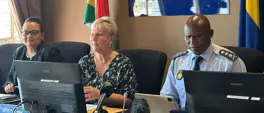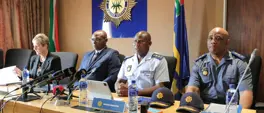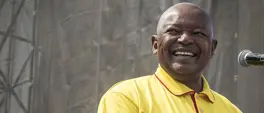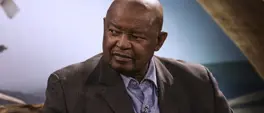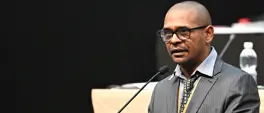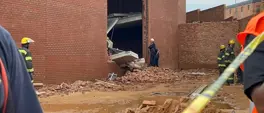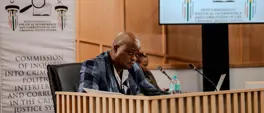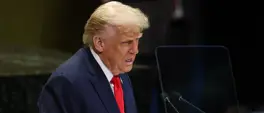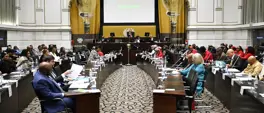CHARLES MATSEKE | National Dialogue must be ripped away from elite capture and returned to ordinary citizens
Charles Matseke
19 August 2025 | 12:18'What of the ordinary man in Soweto, the unemployed graduate in Mthatha, the mother queuing for a grant in Tembisa? None of them were consulted.'
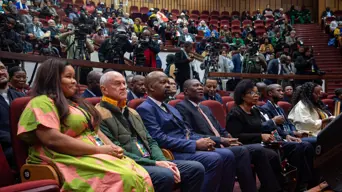
The National Convention held at the University of South Africa (UNISA)’s main campus in Pretoria on 16 August 2025. Picture: Simphiwe Nkosi/EWN
The much-vaunted two-day convention leading up to the so-called national dialogue was meant to resuscitate the long-lost dream of “social cohesion” in South Africa.
Instead, it collapsed under its contradictions, exposing a dialogue that is anything but national.
What unfolded was less a conversation about the fate of a fractured society and more a dress rehearsal for elite theatre, an expensive, self-indulgent performance staged for political insiders, big names, and so-called “eminent persons”.
The setting itself sent a signal. This was not a gathering of South Africa’s grassroots, not a festival of ordinary voices reclaiming their agency in democracy.
It was an event curated by the few, for the few, with logistics and planning that reeked of exclusivity. If the government and its allies had truly believed in the power of dialogue, they would have mobilised communities in advance.
Branch leaders would have gone door to door, as they do when desperate for votes, stirring the imagination of the people, explaining what the dialogue is and why it matters. Instead, the average South African, overburdened by poverty, unemployment, and inequality, remains unbriefed, untouched, and uninspired.
This is not new. Paulo Freire, in Pedagogy of the Oppressed, reminds us that genuine liberation cannot be handed down from above; it must be forged in the lived struggles of the oppressed.
Dialogue, for Freire, is not about elites proclaiming solutions but about a horizontal process where the oppressed discover themselves as makers of history. What we witnessed in this so-called national convention was the opposite: a top-down proclamation where elites spoke for the people rather than with them.
The “Eminent Persons Group” was introduced as the moral compass of the dialogue. On paper, it boasts high-profile individuals, many of them respected in their fields, some even admired nationally. Yet in practice, their presence felt like a contest of egos. Here was Bishop Lekganyane showing face, his stature enlisted as symbolic legitimacy.
There was Thabo Mbeki, whose aura of gravitas is wielded as if the absence of his blessing would doom the entire process.
But their very centrality underscores the problem: this is less about a nation rediscovering its soulthan about elites reaffirming their centrality.
What of the ordinary man in Soweto, the unemployed graduate in Mthatha, the mother queuing for a grant in Tembisa? None of them were consulted.
Their voices remain peripheral, their pain absent from the room. The so-called national dialogue has been reduced to a carefully choreographed spectacle, where the “who” of attendance matters more than the “what” of transformation.
Nothing exposes the predetermined nature of this convention more starkly than the issue of immigration. How does a dialogue pretend to address the complexities of migration without engaging Operation Dudula, an organisation that, however controversial, has mobilised tens of thousands and placed immigration firmly on the national agenda?
To exclude them is not neutrality; it is deliberate sidelining. It is to declare that certain civic movements are not worthy of recognition, dismissed as noise-makers, a term that betrays the ANC elite’s disdain for grassroots mobilisation outside its control.
This is more than a tactical mistake. It is a fatal flaw. By ignoring movements like Operation Dudula, the convention signalled that it is not interested in grappling with the raw anxieties of the street.
Instead, it seeks to sanitise the discourse, keeping uncomfortable truths at bay. Yet democracy thrives not on curated consensus but on the messy confrontation of divergent views.
The second great failure of the convention was its cynicism. Planning was shallow, engagement superficial, and logistics more suited for an elite retreat than a national reckoning. The gathering revealed what many South Africans already suspect - that the national dialogue is being hijacked as another procurement opportunity.
For cadres, this is less about the architecture of national renewal than about catering contracts, hotel stays, per diems, and leisure dinners. In the name of “social compacting,” what emerges is nothing more than stomach infrastructure, a politics of consumption, invoices and patronage.
Indeed, the government’s obsession with “social compacts” is little more than an attempt to usurp the people’ power to drive the process themselves.
Social compacts in South Africa have become top-down arrangements, designed to protect the interests of elites while manufacturing the appearance of consensus.
They bypass genuine civic participation and instead centralise control in the hands of political insiders and their preferred stakeholders.
There were fleeting moments when one could sense a genuine yearning for renewal. In certain corners, delegates spoke passionately about inequality, about the desperate need to restore dignity and rebuild the social fabric. But these voices were drowned out by the dominant tone of elitism.
What could have been a springboard for a new civic awakening became another reminder that power in South Africa gravitates toward itself, building parallel structures to consolidate rather than redistribute influence.
Freire warned of this tendency.
The oppressors, he argued, always fear genuine dialogue, becausetrue dialogue dismantles their monopoly over knowledge and power. What we see in South Africa is the elite’s fear of losing control, hence their preference for parallel processes, managed cadres, and pre-approved talking points.
If this convention was indeed meant to be a precursor to the national dialogue, then the damage has already been done. The ordinary citizen sees nothing of themselves reflected in this process.
They do not see answers to the crises that define their lives: poverty, unemployment, inequality. They see elites in suits, throwing shade at one another, gathering at plush venues, eating well, speaking big and doing nothing to overcome the plight of the poor.
And so, when the local government elections of 2026 arrive, they will carry into the dialogue a spirit of deep disillusionment.
The absence of grassroots awareness today will translate into voter apathy or, worse, voter rage tomorrow. The national dialogue, once billed as a moment of healing, risks becoming a monument to failure and political turmoil.
South Africa desperately needs a conversation about its future. But what we saw in this convention was not conversation, it was performance. The national dialogue, if it is to mean anything, must be ripped away from elite capture and returned to the people themselves. Branches, communities, churches, unions, youth organisations, these are the spaces where dialogue must be seeded.
Until then, this project will remain what it currently is: elites talking to elites while the nation waits outside. Or as Freire might put it, an “anti-dialogue” that perpetuates domination rather than dismantles it.
True dialogue is dangerous precisely because it empowers the oppressed to become co-creators of history. That is the dialogue South Africa needs, not another hotel-bound spectacle of eminent persons, but a radical reclaiming of voice by the people themselves. Without it, there will be no happy ending.
Charles Matseke (MPhil in Politics and International Relations) is a researcher and writer with a keen interest in contemporary political dynamics. His research focuses on electoral politics, foreign policy analysis, and international relations, with a particular emphasis on the Global South and Africa's role in global affairs.
Get the whole picture 💡
Take a look at the topic timeline for all related articles.
Trending News
More in Opinion
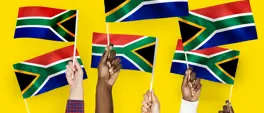
3 March 2026 11:40
Who belongs in South Africa? UCT philosopher weighs in on identity and ownership
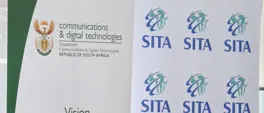
2 March 2026 11:05
TLALI TLALI |Mandate, money and accountability - What the government website debate really reveals

27 February 2026 11:00
JAMIL F. KHAN | Human rights last on the list for global leadership agenda



